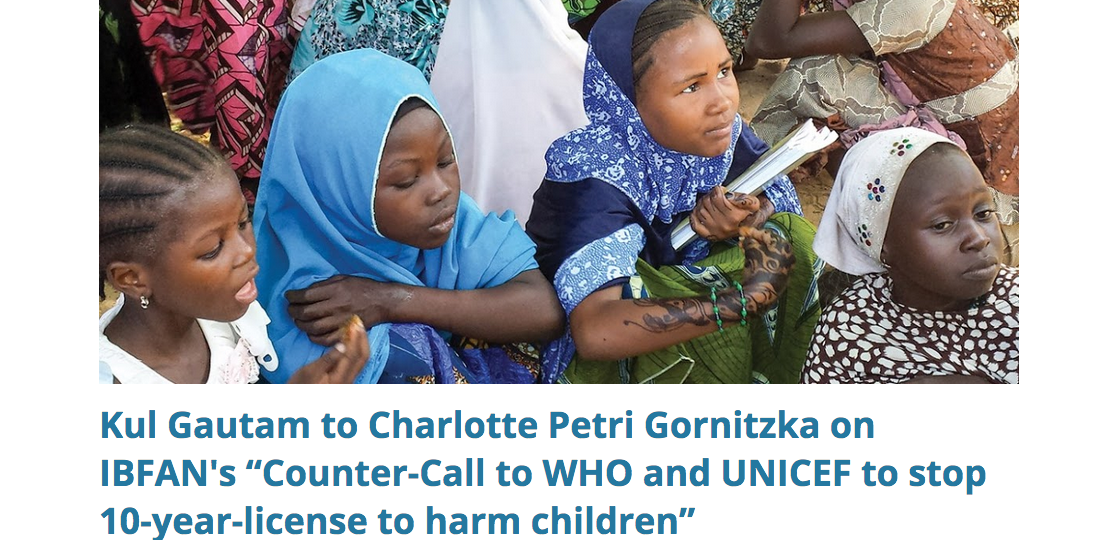
Kul Gautum, former deputy executive director of UNICEF and Assistant Secretary-General of the United Nations
Dear Charlotte,
It has come to my attention and that of many UNICEF retirees, that in June 2020, UNICEF and WHO along with several reputable organizations like Save the Children, BRAC, etc. co-signed a Breastmilk Substitutes (BMS) Call to Action, addressed to all manufacturers of BMS, that they should voluntarily commit to fully abide by the International Code of Marketing of Breastmilk Substitutes (the Code) by 2030. The International Baby Food Action Network (IBFAN) that has been a close partner of both UNICEF and WHO for many decades has criticized the BMS Call to Action and issued a strong “Counter-Call to WHO and UNICEF to stop 10-year-license to harm children”. (See attachment).
Some of us former senior UNICEF and WHO officials who were directly involved in or are very familiar with the history of the prolonged debates, negotiations, and decision-making about the Code and its implementation, were very surprised to learn about the BMS Call to Action and the IBFAN’s Counter Call to WHO and UNICEF.
We are painfully aware that many infant formulae and baby food companies have a long history of being extremely deceptive and manipulative about their compliance with the Code. Whenever there is a change of leadership at UNICEF and WHO, they try to convince and win over the new leadership with very clever and deceptive arguments, and “evidence” of their compliance.
Sometimes, lacking or ignoring institutional memory, the new leadership becomes gullible to such manipulation. I recall at UNICEF we had two such instances in which Nestlé deployed very high-level and seemingly reputable lobbyists to influence our decision-making.
One was in the late 1990s/early 2000s when former US Vice Presidential candidate Geraldine Ferraro tried to persuade Carol Bellamy to enter into a “win-win” partnership agreement with Nestlé. Following a thorough review with her senior staff and experts, Ms. Bellamy wisely rejected this “win-win formula”. The other was in the late 2000s when very senior officials of Nestlé directly approached Ann Veneman. While no agreement was reached with UNICEF, we were all stunned and chagrined that Ms. Veneman joined the Nestlé Board soon after leaving UNICEF!
In the case of the recent BMS Call to Action, at first, it looks pretty innocent, well-meaning, and pragmatic. We note that the Bill and Melinda Gates Foundation, that has made such a positive contribution to global health which we all admire is also a prime mover of the BMS Call, lending it extra credibility.
However, we note that IBFAN’s careful analysis raises huge and legitimate questions which merit serious consideration by UNICEF and WHO.
The IBFAN’s Counter Call refers to the 2018 report by the UN Secretary-General’s Independent Accountability Panel for Women’s, Children’s and Adolescent Health (IAP-EWEC) which made a number of recommendations to hold the private sector more strictly accountable. I was Co-Chair of IAP at that time, and our report was indeed quite strong in calling for holding the private sector to a much stronger and tighter framework of accountability. We also pointed out that the UN Secretary-General’s Global Compact was being used by some private companies, including the infant formula and baby food industry, to “blue-wash” themselves and avoid accountability.
In light of this history, I sincerely hope that UNICEF (and WHO as well) will take the IBFAN’s Counter Call very seriously and revisit its endorsement of the BMS Call to Action.
Thank you.
https://iapewec.org/reports/annual-reports/2018report/
________________________________________________________
BREASTFEEDING CHALLENGE TO WHO AND UNICEF
Sir Richard Jolly, former deputy executive director of UNICEF.
Peter Greaves, Nutrition Advisor to UNICEF
https://xunicefnewsandviews.blogspot.com/2020/10/an-important-call-to-action-on.html
In 1981 the World Health Assembly (WHA) adopted the International Code of Marketing of Breastmilk Substitutes (the Code). UNICEF was involved with the development of the Code, and subsequently has actively supported governments in the implementation of the Code and relevant later WHA resolutions. But while much progress has been made, and many governments have incorporated the Code, in whole or in part, into their own legislation, baby food companies continue to evade compliance with components of the Code. The International Baby Food Action Network (IBFAN), which has 270 groups in 160 countries, has worked alongside WHO and UNICEF for decades and has monitored Code compliance on a regular basis. The latest attempt of the baby food industry to deflect criticism has been to announce in June 2020 a Breastmilk Substitutes (BMS) Call to Action, issued by WHO and UNICEF and 6 NGOs and addressed to all manufacturers of BMS, that they should voluntarily commit to abide fully by the Code by 2030. . Even if companies make commitments, it would imply a further decade of manipulation. This BMS Call has not been endorsed by the WHA, so those countries whose laws are already strong may be placed in a dilemma and under pressure to weaken them. IBFAN has issued a Counter-Call (see below), denouncing the BMS Call, setting out in detail its many disadvantages, and asking WHO and UNICEF and concerned NGOs and institutions to disassociate themselves from it.
Sir Richard Jolly, former Deputy-Director of UNICEF, and Dr Peter Greaves, former nutrition adviser in New York involved in these matters, commend the IBFAN Counter-Call to all members of XUNICEF. Those who may wish to join the Counter-Call are asked to contact Dr JP Dadhich, Co-Chair of IBFAN at jpdadhich@bpni.org
__________________________________________________________
